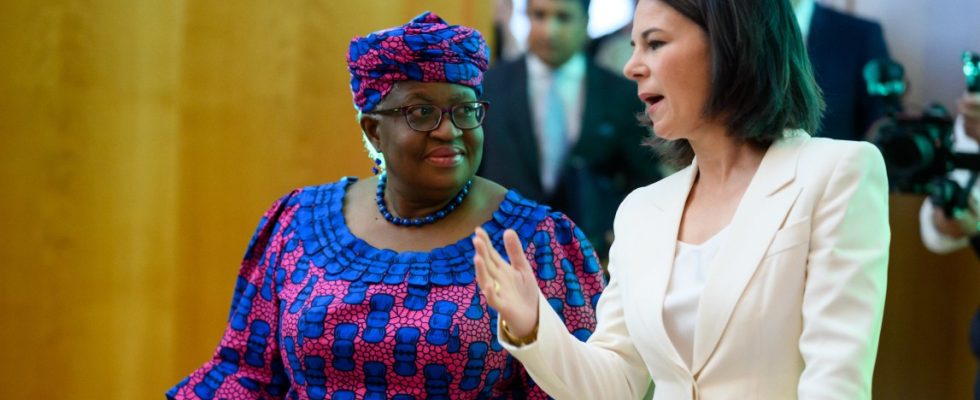The annual “Conference of the heads of German missions abroad” is something like a class reunion of diplomacy: four days of exchange between the ambassadors and with the head of the house. And an opportunity for Minister Annalena Baerbock to give her people at around 230 representative offices basic information.
Last year she called for a culture change in communication: it’s better to get into a shit storm on the short message service Twitter, which is now called “X”, than to play no role in the public of the host country. The participants in the event, affectionately known as “BoKo” (Ambassadors’ Conference), didn’t need to be told twice: in Washington, Emily Haber fought Twitter duels with Republican Senator JD Vance, who harshly criticized Germany. Your new State Secretary Thomas Bagger, previously Ambassador in Warsaw, refused to accept hostilities from the Polish government. And in India, Philipp Ackermann created a small social media hit with a video of a dance performance.
There has been no blueprint for Germany’s role since the start of the Ukraine war
This time, Baerbock spelled out German foreign policy’s claim to shaping German foreign policy more clearly than ever before – as an appropriate reaction to the changes in the world: the Russian war of aggression against Ukraine, but also China’s rise to an economic and geopolitical superpower and the increasingly multipolar nature of international relations.
Baerbock goes through the phases of German foreign policy: those after the crimes of the Nazi regime, a second that began with the admission of the Federal Republic and the GDR to the United Nations, and a third with the upheavals in Eastern Europe and German reunification. At that time, instructions to the missions at the UN or other multilateral institutions often said – rightly so – that one would “not close oneself to an emerging consensus”.
But while checkbook diplomacy and political restraint had their time, Germany’s role had changed drastically with the Balkan wars – under Joschka Fischer, the first Green foreign minister, a formative political figure for Baerbock. Foreign policy cannot be “simply copied from the past” but has to be constantly rethought. Today it is about networked security, international climate policy, the global containment of crises and conflicts, the fight against poverty, hunger and suffering. The risk of failure cannot be ruled out, says Baerbock – as in the Sahel zone. But that, in essence, shouldn’t stop you from looking for new approaches and new solutions.
The starting point for Baerbock in all these considerations is Germany’s role in a united Europe. This has already changed drastically as a result of Russia’s war of aggression against Ukraine and the turning point proclaimed by Chancellor Olaf Scholz – there was no blueprint for that either. Germany must now resolutely press ahead with the enlargement and integration of the EU.
Plea for majority decisions in the foreign and security policy of the EU
She affirmed that Ukraine, Moldova, the states of the Western Balkans and, in the future, Georgia should join the EU. At the same time, one must work to ensure that Europe, with more than 30 countries, remains strong and capable of acting. That is why Germany, together with partners, is committed to majority decisions in the common foreign and security policy. She also believes that new forms of European institutions and cohesion policy are necessary. The EU must be strengthened as a geopolitical actor.
Anyone who wants enlargement “must also work to ensure that the EU pushes ahead with the necessary reforms”. Baerbock announced that before the European Council of Heads of State and Government in Berlin in December he would invite people to a major European conference to “discuss what steps we need to take in the European Union with a view to enlargement, the underlying reforms are”.
Baerbock has repeatedly emphasized that Germany always wants to act as a “fair team player” – the leadership claim she has formulated should not offend anyone and is embedded in a strong commitment to the rule-based multilateral order. She warns that if multipolarity means that even “more big ones make up the order in the back room among themselves,” that would be a nightmare for small and medium-sized countries.
She announced that she would expand Germany’s global partnerships, work more closely with the countries of Africa, Latin America and Asia, and further develop international organizations and international law. You have to be open to the concerns of your partners and self-critically reflect on your own past, including colonial history. The states would also have to be heard, for example in the UN Security Council. And, last but not least, you have to see what others are offering – especially China.
The guest of honour, the Director General of the World Trade Organization Ngozi Okonjo-Iweala, who comes from Nigeria, had words of warning ready. The West has missed many opportunities. In Africa, the reality is that people are seeing improvements from new infrastructure with help from China, she said. She has heard from some colleagues that if you cooperate with China, “we’ll get a new airport”, but there are “instructions” from Europe. Even Baerbock, who defended a “value-based foreign policy,” would probably not have formulated the self-criticism so drastically.

